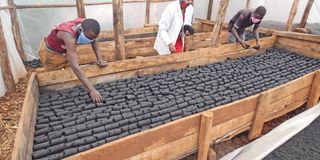Hey, don’t throw away cow dung, make briquettes

Esther Njeri and two of her employees sort briquettes at her enterprise in Kutus, Kirinyaga County where together with her husband, Daniel Gitari, they make the products. The couple distribute their briquettes in Kirinyaga, Embu and Nyeri counties. PHOTO | CAROLINE WAMBUI | NATION MEDIA GROUP
What you need to know:
- The starchy juice from potato peels, according to Gitari, helps the briquettes burn longer – for up to eight hours.
- The briquettes are then put in a solar dryer where they stay for four days before being packaged in 40kg packs and sold at Sh2,000 to wholesalers.
- The mixed ingredients are then compressed into a tube-like shape and cut manually into various sizes.
- The machines include a crusher, which costs about Sh100,000, two mixers, with the small one going for Sh30,000 and a bigger one selling at Sh200,000, as well as a compressor.
Dung is gold, so goes the popular saying among livestock farmers, though few mine the wealth from the resource that their animals produce in plenty.
Esther Njeri and her husband Daniel Gitari, both 60, however, are among the few farmers who have managed to turn dung into black gold.
On their farm in Kibothere village, half a kilometre from Kutus town in Kirinyaga County, they keep eight dairy animals, three of which produce 30 litres of milk daily. They also get dung from the animals that they use to make briquettes.
“We started making briquettes out of the need to get rid of the slurry that comes from the cowsheds, which was becoming an eyesore. The animals produce about half a tonne every day,” says Gitari.
An adult animal on average passes dung 13 times a day, which ranges from 17 to approximately 55kg, depending on the type, sex and size. The dung, if not well taken care of, can become a big problem, causing environmental pollution.
Before embarking on making briquettes, Gitari says he consulted experts at the Jomo Kenyatta University of Agriculture and Technology (JKUAT), who took them through the process.
They then invested over Sh500,000 in the necessary machinery and sourced for waste products such as charcoal dust, which is used in making the fuel.
The machines include a crusher, which costs about Sh100,000, two mixers, with the small one going for Sh30,000 and a bigger one selling at Sh200,000, as well as a compressor.
FREE FROM IMPURITY
“We use three ingredients to make briquettes. These are slurry from the cows, potato peelings and charcoal dust. The latter we source from charcoal dealers at Sh400 a sack,” says Esther.
The couple gets potato peels from hotels. The peels are then put in a drum where water is filled and heated to boiling point, after which the residues are sieved and used as an ingredient in making the briquettes.
The process of making briquettes starts with sieving charcoal dust to free it from any impurity. The dust is then crushed into some fine powder, after which it is put in a mixer and slurry and potato peels are added.
The starchy juice from potato peels, according to Gitari, helps the briquettes burn longer – for up to eight hours.
The mixed ingredients are then compressed into a tube-like shape and cut manually into various sizes.
The briquettes are then put in a solar dryer where they stay for four days before being packaged in 40kg packs and sold at Sh2,000 to wholesalers.
“Briquettes are a clean cooking fuel that helps keep the environment safe and does not damage one’s health since they are smokeless,” notes Esther, adding that they have eight workers on the farm.
The couple distribute their briquettes in Kirinyaga, Embu and Nyeri counties.
Patrick Kareru, an associate professor of chemistry at JKUAT, notes that farm products that are often considered waste such as rice husks, normal grass, maize cobs and stalks with a few additives can be used in making briquettes, which earn farmers more income.




